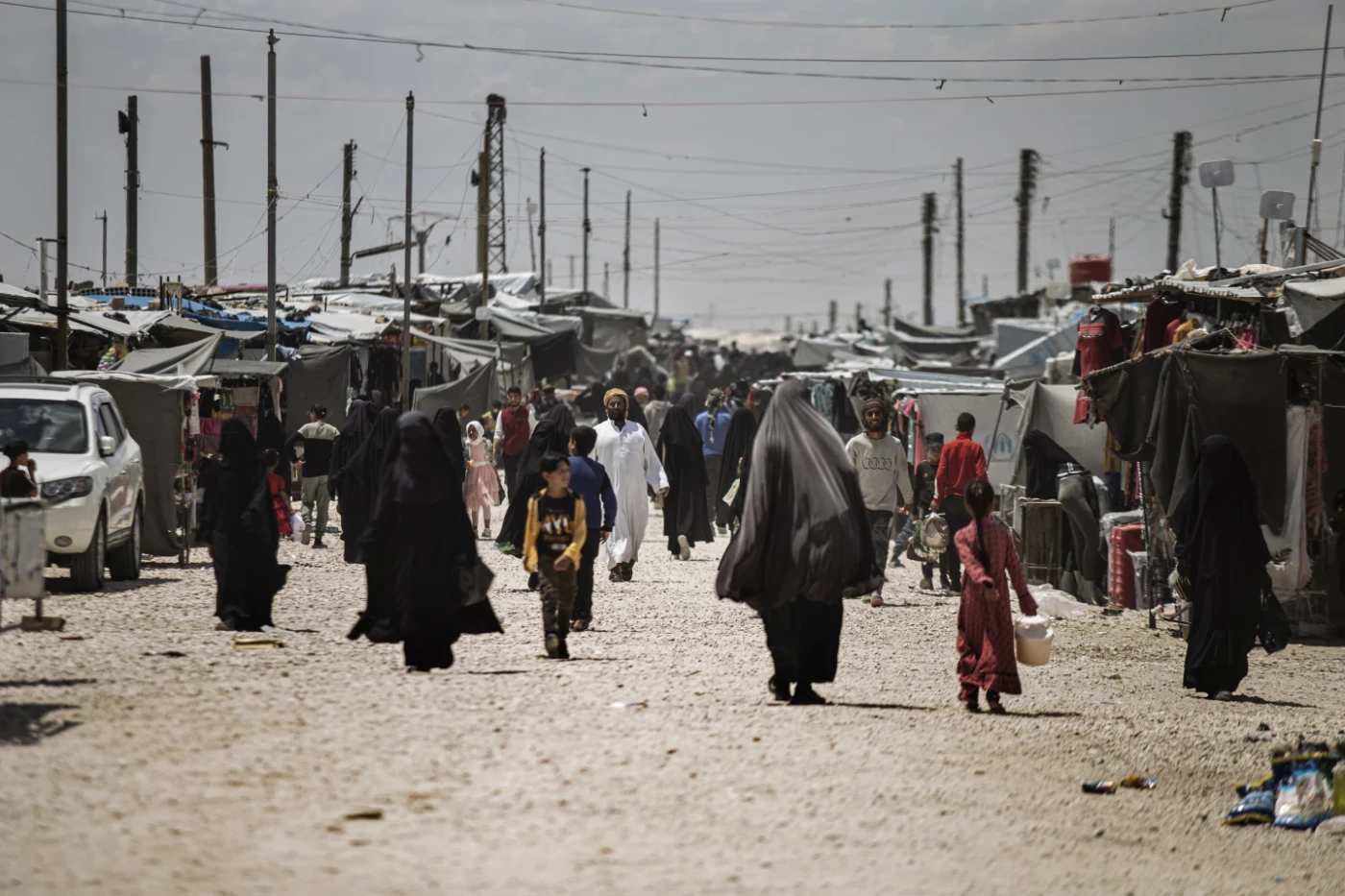DUBAI, UAE - After the fall of Bashar al-Assad’s regime and the armed Syrian opposition taking over Syria, the notorious al-Hol Camp, which houses thousands of families associated with ISIS, has become an increasing threat to Iraq. This is due to the shared border between Iraq and Syria and ongoing instability in the Middle East.
Located in the Hasakah province in northern Syria, Al-Hol is one of the largest camps, hosting approximately 40,000 displaced people from 42 different nationalities, including families of Iraqi, Syrian, and foreign ISIS militants.
Iraq fears the repercussions of deteriorating conditions at al-Hol or a possible escape of camp residents into Iraq, potentially destabilizing the country’s security.
In a recent phone call with Hamish Falconer, the UK’s minister of state for the Middle East and North Africa, Iraqi Foreign Minister Fuad Hussein warned of the dangers of ISIS elements escaping detention and the subsequent impact on Iraq’s security.
Hussein said ISIS is “reorganizing its ranks, having seized large amounts of weapons left behind by the collapsing Syrian army, enabling it to expand control over additional areas.”
According to official statistics, al-Hol Camp houses 25,000 Iraqi individuals, including 20,000 minors under the age of 18.
Iraq’s National Security Advisory has reported that over 2,600 Iraqi families have been repatriated from the camp, with more than 2,000 families returning to their original areas. The remaining 600 families are undergoing rehabilitation before reintegrating with their local communities.
Kareem Aliawi al-Mohammedi, chairman of the parliamentary committee on security and defense, said the ongoing developments in Syria significantly affect Iraq and the broader region.
“The Syrian landscape is rife with divergent movements, parties, and terrorists, including ISIS and al-Nusra, supported by Turkey, the US, Israel, and other Western countries,” Mohammedi said. “The newly formed Syrian government struggles to stabilize the country amid ongoing internal turmoil.”
He noted that “the al-Hol camp and other detention facilities under the control of the Syrian Democratic Forces (SDF) significantly affect Iraq’s security. Turkey’s threats to target the SDF could result in prison breaks, releasing thousands of ISIS militants who had operated in Iraq and Syria, posing a severe threat to Iraqi territories.”
Al-Mohammedi also pointed out that “many nations, particularly the US and Israel, do not want Iraq to stabilize and are calling for the dissolution of the Popular Mobilization Forces and other Iraqi factions.”
“Iraq is part of the resistance axis and a barrier to Israel and the US. The targeting of Iraq is evident, with various states working to create instability,” he said.
Former military adviser retired Maj. Gen. Safaa al-Assam described Al-Hol Camp as a “corrupt hotbed rife with dangerous sectarian, Wahhabi, and Salafi ideologies.”
“The camp contains two generations: the first, aged 8 to 10 years at the start of the crisis, is now over 20 years old. The second generation includes infants or those unborn at the time, who are now around 12 years old,” Assam told The New Region. "These generations are steeped in ISIS ideologies.”
He noted that foreign journalists visiting the camp have observed children being trained to kill using cats and dogs as practice, describing the environment as a "breeding ground for future killers."
“Even the imams in al-Hol Camp are ISIS-affiliated,” he added, stressing that dismantling al-Hol Camp is "critical".
To address the threat, Iraqi authorities have bolstered border security with Syria by building concrete walls, installing barbed wire and thermal cameras, and reinforcing border guards with additional army and Popular Mobilization Forces units.
Security and political analyst Ali al-Baydar argued that fears surrounding al-Hol are likely overblown.
“The detainees in Syrian prisons are under the control of the SDF, which understands the severity of these extremists and ensures their facilities are heavily secured,” Baydar told The New Region. “Iraq today is not the same as it was in 2013 or 2014. The country’s security forces are far more prepared and equipped.”
Baydar downplayed the immediate threat of al-Hol, stating that the camp mainly houses women, children, and the elderly. However, he underscored the importance of fortifying Iraq’s borders and internal front, given the lack of local support for terrorism compared to previous years.
In November, the SDF uncovered tunnels, weapons, military uniforms, and logistical equipment, including computers and mobile phones, inside al-Hol Camp. They thwarted an active ISIS cell’s attempt to escape and conduct terrorist operations, apprehending 16 operatives.



 Facebook
Facebook
 LinkedIn
LinkedIn
 Telegram
Telegram
 X
X


